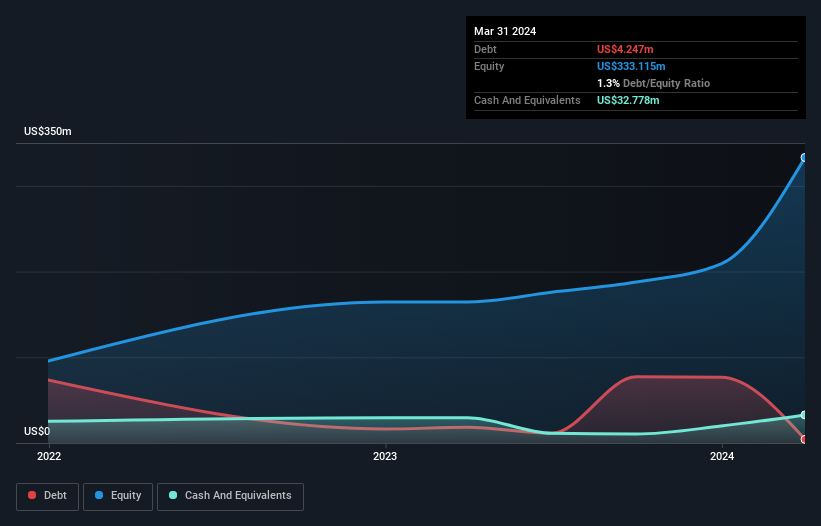- United States
- /
- Consumer Durables
- /
- NYSE:SDHC
Smith Douglas Homes (NYSE:SDHC) Has A Pretty Healthy Balance Sheet

David Iben put it well when he said, 'Volatility is not a risk we care about. What we care about is avoiding the permanent loss of capital.' So it seems the smart money knows that debt - which is usually involved in bankruptcies - is a very important factor, when you assess how risky a company is. We can see that Smith Douglas Homes Corp. (NYSE:SDHC) does use debt in its business. But the more important question is: how much risk is that debt creating?
When Is Debt A Problem?
Debt and other liabilities become risky for a business when it cannot easily fulfill those obligations, either with free cash flow or by raising capital at an attractive price. In the worst case scenario, a company can go bankrupt if it cannot pay its creditors. However, a more common (but still painful) scenario is that it has to raise new equity capital at a low price, thus permanently diluting shareholders. Of course, the upside of debt is that it often represents cheap capital, especially when it replaces dilution in a company with the ability to reinvest at high rates of return. When we think about a company's use of debt, we first look at cash and debt together.
Check out our latest analysis for Smith Douglas Homes
How Much Debt Does Smith Douglas Homes Carry?
As you can see below, Smith Douglas Homes had US$4.25m of debt at March 2024, down from US$18.4m a year prior. However, it does have US$32.8m in cash offsetting this, leading to net cash of US$28.5m.

A Look At Smith Douglas Homes' Liabilities
According to the last reported balance sheet, Smith Douglas Homes had liabilities of US$19.8m due within 12 months, and liabilities of US$48.3m due beyond 12 months. Offsetting these obligations, it had cash of US$32.8m as well as receivables valued at US$6.23m due within 12 months. So it has liabilities totalling US$29.1m more than its cash and near-term receivables, combined.
Of course, Smith Douglas Homes has a market capitalization of US$1.24b, so these liabilities are probably manageable. Having said that, it's clear that we should continue to monitor its balance sheet, lest it change for the worse. Despite its noteworthy liabilities, Smith Douglas Homes boasts net cash, so it's fair to say it does not have a heavy debt load!
On the other hand, Smith Douglas Homes's EBIT dived 15%, over the last year. If that rate of decline in earnings continues, the company could find itself in a tight spot. The balance sheet is clearly the area to focus on when you are analysing debt. But it is future earnings, more than anything, that will determine Smith Douglas Homes's ability to maintain a healthy balance sheet going forward. So if you're focused on the future you can check out this free report showing analyst profit forecasts.
Finally, while the tax-man may adore accounting profits, lenders only accept cold hard cash. Smith Douglas Homes may have net cash on the balance sheet, but it is still interesting to look at how well the business converts its earnings before interest and tax (EBIT) to free cash flow, because that will influence both its need for, and its capacity to manage debt. During the last three years, Smith Douglas Homes produced sturdy free cash flow equating to 71% of its EBIT, about what we'd expect. This free cash flow puts the company in a good position to pay down debt, when appropriate.
Summing Up
While it is always sensible to look at a company's total liabilities, it is very reassuring that Smith Douglas Homes has US$28.5m in net cash. And it impressed us with free cash flow of US$39m, being 71% of its EBIT. So we are not troubled with Smith Douglas Homes's debt use. When analysing debt levels, the balance sheet is the obvious place to start. However, not all investment risk resides within the balance sheet - far from it. Be aware that Smith Douglas Homes is showing 3 warning signs in our investment analysis , and 2 of those are concerning...
If you're interested in investing in businesses that can grow profits without the burden of debt, then check out this free list of growing businesses that have net cash on the balance sheet.
New: Manage All Your Stock Portfolios in One Place
We've created the ultimate portfolio companion for stock investors, and it's free.
• Connect an unlimited number of Portfolios and see your total in one currency
• Be alerted to new Warning Signs or Risks via email or mobile
• Track the Fair Value of your stocks
Have feedback on this article? Concerned about the content? Get in touch with us directly. Alternatively, email editorial-team (at) simplywallst.com.
This article by Simply Wall St is general in nature. We provide commentary based on historical data and analyst forecasts only using an unbiased methodology and our articles are not intended to be financial advice. It does not constitute a recommendation to buy or sell any stock, and does not take account of your objectives, or your financial situation. We aim to bring you long-term focused analysis driven by fundamental data. Note that our analysis may not factor in the latest price-sensitive company announcements or qualitative material. Simply Wall St has no position in any stocks mentioned.
Have feedback on this article? Concerned about the content? Get in touch with us directly. Alternatively, email editorial-team@simplywallst.com
About NYSE:SDHC
Smith Douglas Homes
Designs, constructs, and sale of single-family homes in the southeastern United States.
Excellent balance sheet and slightly overvalued.
Market Insights
Community Narratives



